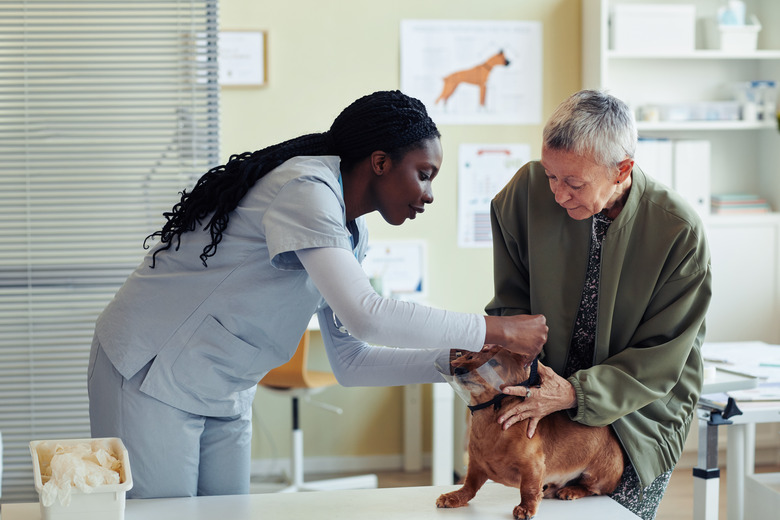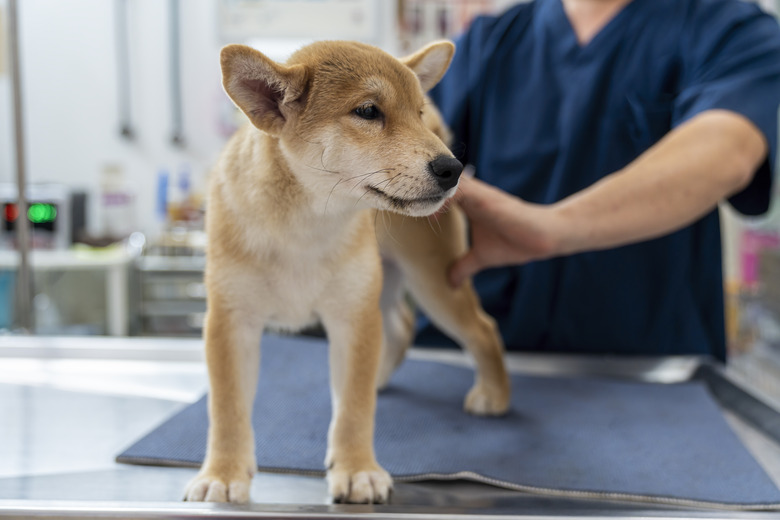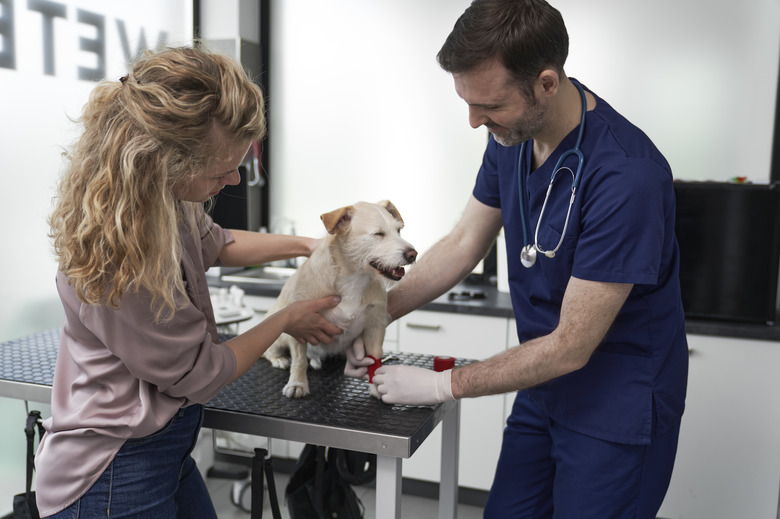What Are The Treatments For Colic In Dogs?
Your dog isn't feeling well, and you feel helpless. There are many reasons your dog may have stomach upset or gas buildup, sometimes referred to as colic. We spoke to Dr. Ingrid Taylor, a veterinarian with 16 years of experience in general clinical and emergency practice and public health, to find out more. Underlying causes of gastrointestinal pain include gastric or intestinal obstruction, diet changes, food allergies, internal parasites, stomach ulcer, and ingestion of something leading to gastroenteritis.
The course of treatment will depend on what is causing the pain in the first place. If your dog is experiencing symptoms, contact your veterinarian in order to help them feel better as soon as possible. Your dog will need a physical examination and tests to diagnose the condition, and they may require hospitalization or surgery.
Gastrointestinal upset in dogs
Gastrointestinal upset in dogs
To prevent stomach upset in bottle-fed puppies, be sure to use the proper technique so they don't take in too much air while feeding.
"Without the proper technique, puppy milk replacer, and burping after feeding, gas buildup can occur," says Dr. Taylor."Another problem that can cause symptoms of colic in dogs is constipation." Signs of constipation include straining to defecate and the passage of firm, dry feces. Dog colic may cause your dog to become weak and lethargic, restless, lose their appetite, or experience flatulence. They may lose their appetite or experience flatulence.
Constipation can be caused by many different issues ranging from a dietary change to hormonal diseases to intestinal obstruction. It's important to determine the underlying cause of the constipation, as well as to take measures to relieve the dog's discomfort. Depending on the cause, your veterinarian may prescribe stool softeners as part of the treatment.
Gastroenteritis, or inflammation of the digestive system, is another type of stomach pain in dogs that can be caused by infection, medication, viruses, parasites, or spoiled food. Symptoms include vomiting and diarrhea, abdominal tenderness, and lethargy. "Gastroenteritis is often treated by supportive care like rehydration, but if a cause can be identified, that should also be treated," explains Dr. Taylor. "Electrolytes and fluids may be given orally, subcutaneously, or intravenously, depending on how severe the vomiting and diarrhea are."
Gastrointestinal obstructions in dogs
Gastrointestinal obstructions in dogs
Obstructions of the digestive tract can result from your dog eating or chewing foreign objects, like toys, rocks, or garbage. In older dogs, the source of the obstruction may be a tumor or mass. Blockages in the stomach or intestines can prevent solids or liquids from passing through the gastrointestinal tract. This can become life-threatening if not treated.
Signs that your dog may have an obstruction include vomiting, diarrhea, weakness, loss of appetite, stomach pain, whining, and dehydration. Symptoms like this can occur with other conditions, like pancreatitis, so it's essential to seek veterinary attention for the proper diagnosis. To prevent obstructions and the problems that go with it, make sure your dog doesn't have access to things they shouldn't swallow.
Treatment for gastrointestinal obstructions in dogs
Treatment for gastrointestinal obstructions in dogs
Call your veterinarian as soon as you suspect your dog may have eaten something that could cause a blockage. Your veterinarian will likely take X-rays or perform an ultrasound to determine the treatment. Some obstructions may be removed with an endoscope. However, if the object can't be removed with endoscopy, or it does not pass into the dog's stool, surgery will be required. Intravenous fluids will be administered to alleviate dehydration.
"Treatment will depend on the condition, and various possible treatments can be discussed," says Dr. Taylor.
After treatment, follow your veterinarian's recommendations. This will likely include monitoring your dog closely, keeping activity moderate, feeding bland food, and providing plenty of fresh water so they can continue to hydrate. An obstruction is a serious problem so seek help.
Causes and symptoms of bloat in dogs
Causes and symptoms of bloat in dogs
Another very serious gastric health problem is bloat, or gastric dilatation-volvulus (GDV). Bloat is a life-threatening emergency caused by twisting of the stomach and accumulation of gas.
Bloat tends to affect larger dogs, but it can happen in any dog. Stress can cause an acute episode of bloat. Other risk factors include a lean body, hyper or fearful behavior, once-daily feedings, dry food diet, and eating quickly. Dogs with bloat commonly have eaten a large meal followed by exercise and repeated, unsuccessful attempts to vomit. Signs of bloat may include restlessness, wanting to go out frequently, apparent discomfort, abdominal pain and swelling, repeated dry retching, panting, or excessive drooling.
Treatment for bloat in dogs
Treatment for bloat in dogs
"Dogs with bloat can die within a short amount of time, so they need emergency veterinary care," says Dr. Taylor. Your veterinarian will first stabilize the dog by treating the shock and will need to perform surgery. Surgery involves two procedures. The stomach is first deflated and placed in its correct position. Any damaged or dead stomach tissue is removed. Second, to prevent bloat from occurring again, the stomach is attached to the abdominal wall. Your dog will likely need to avoid food for 48 hours after surgery. Drugs for pain or vomiting may be prescribed.
The bottom line
The bottom line
Abdominal pain can be a nonspecific symptom of other serious conditions and should never be ignored. Whether your dog is experiencing mild constipation or suffering from a much more severe condition, like bloat, consult your veterinarian as soon as you notice symptoms. Treatments will vary, but surgery may be necessary.


